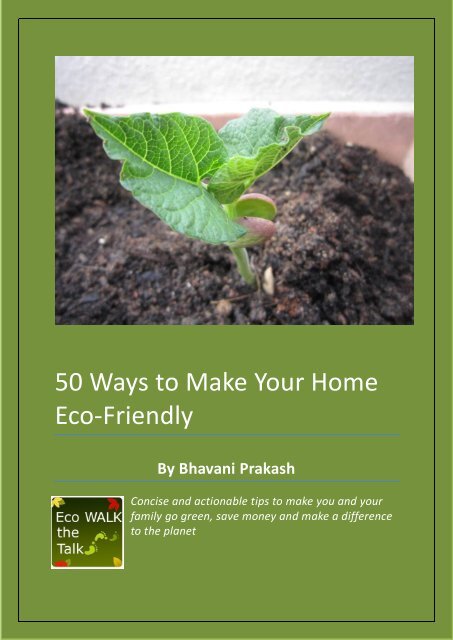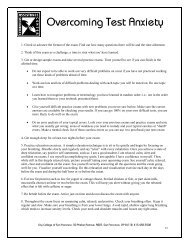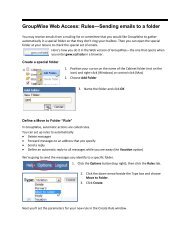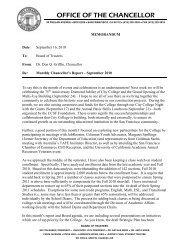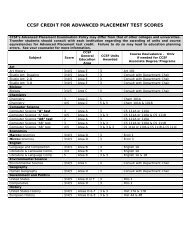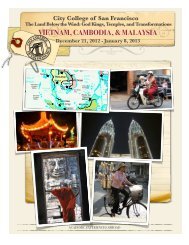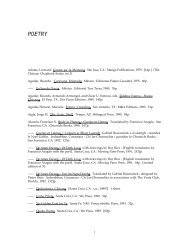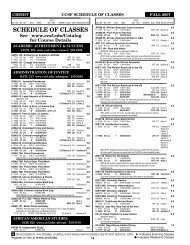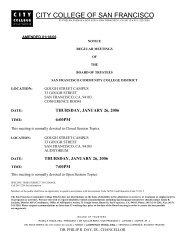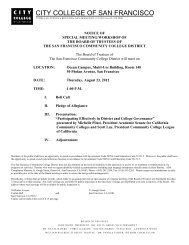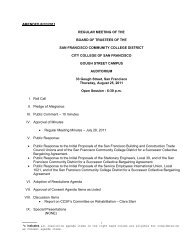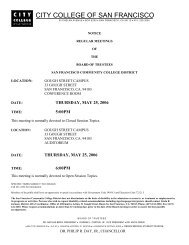Create successful ePaper yourself
Turn your PDF publications into a flip-book with our unique Google optimized e-Paper software.
<strong>50</strong> <strong>Ways</strong> <strong>to</strong> <strong>Make</strong> <strong>Your</strong> <strong>Home</strong> <strong>Eco</strong>-<strong>Friendly</strong><br />
<strong>50</strong> <strong>Ways</strong> <strong>to</strong> <strong>Make</strong> <strong>Your</strong> <strong>Home</strong><br />
<strong>Eco</strong>-<strong>Friendly</strong><br />
By Bhavani Prakash<br />
Concise and actionable tips <strong>to</strong> make you and your<br />
family go green, save money and make a difference<br />
<strong>to</strong> the planet
<strong>50</strong> <strong>Ways</strong> <strong>to</strong> <strong>Make</strong> <strong>Your</strong> <strong>Home</strong> <strong>Eco</strong>-<strong>Friendly</strong> <strong>Eco</strong> WALK the Talk.com<br />
5<strong>50</strong> Wa<br />
Table of Contents :<br />
REDUCE TOXINS ............................................................................. 4<br />
1. Use non-<strong>to</strong>xic cleaners ............................................................................................... 4<br />
2. Use less but better quality cosmetics .......................................................................... 5<br />
3. Improve Indoor Air Quality ......................................................................................... 5<br />
REDUCE STUFF ............................................................................... 6<br />
4. Rent, borrow, freecycle .............................................................................................. 6<br />
5. Reduce the use of paper ............................................................................................. 6<br />
6. Reduce the use of plastic bags .................................................................................... 7<br />
7. Reduce the use of plastic water bottles ...................................................................... 8<br />
8. Use rechargeable batteries ......................................................................................... 9<br />
9. Simplify your wardrobe .............................................................................................. 9<br />
10. Use ethical jewellery................................................................................................. 10<br />
11. Use sustainable furniture.......................................................................................... 10<br />
EAT BETTER .................................................................................. 10<br />
12. Eat less meat ............................................................................................................ 10<br />
13. Eat local/seasonal/ organic/ fairtrade ....................................................................... 11<br />
14. Minimise your consumption of processed foods ....................................................... 13<br />
15. Watch out for palm oil .............................................................................................. 13<br />
16. Avoid genetically modified (GM) content in food...................................................... 13<br />
GARDENING ................................................................................. 14<br />
17. Grow your own food................................................................................................. 14<br />
18. Compost your kitchen waste .................................................................................... 15<br />
19. Organic gardening .................................................................................................... 15<br />
CONSERVE ENERGY ...................................................................... 16<br />
20. Switch off and unplug electrical and electronic devices ............................................ 16<br />
21. Get a wattage reader device or an energy usage moni<strong>to</strong>r ......................................... 17<br />
22. Upgrade <strong>to</strong> energy efficient appliances .................................................................... 17<br />
23. Use energy efficient lighting ..................................................................................... 17<br />
24. Save energy with your airconditioners ...................................................................... 18<br />
25. Use tankless or instant water heaters ....................................................................... 18<br />
26. Keep your refrigera<strong>to</strong>r in good working condition .................................................... 19<br />
© www.ecowalkthetalk.com Join us on<br />
Facebook : http:// www.facebook.com/ecowalkthetalk<br />
Twitter: http://twitter.com/ecowalkthetalk<br />
YouTube : http://www.youtube.com/user/ecowalkthetalk
<strong>50</strong> <strong>Ways</strong> <strong>to</strong> <strong>Make</strong> <strong>Your</strong> <strong>Home</strong> <strong>Eco</strong>-<strong>Friendly</strong> <strong>Eco</strong> WALK the Talk.com<br />
5<strong>50</strong> Wa<br />
27. Conserve energy with your washing machine ........................................................... 19<br />
28. Get an energy audit done ......................................................................................... 20<br />
29. Buy green electricity or use renewable energy ......................................................... 20<br />
CONSERVE WATER ....................................................................... 21<br />
30. Install water flow restric<strong>to</strong>rs ..................................................................................... 21<br />
31. Fix Water Leaks ........................................................................................................ 21<br />
32. Reuse water ............................................................................................................. 22<br />
33. Install a Grey Water System ...................................................................................... 22<br />
EFFICIENT HOME DESIGN ............................................................. 23<br />
34. <strong>Make</strong> your home structurally efficient ...................................................................... 23<br />
ANIMAL WELFARE ........................................................................ 23<br />
35. Avoid fur products and exotic pets ........................................................................... 23<br />
36. Buy Cruelty Free ....................................................................................................... 24<br />
BABY CARE ................................................................................... 24<br />
37. Raise an eco-baby ..................................................................................................... 24<br />
SPECIAL EVENTS ........................................................................... 25<br />
38. Celebrate a Green Birthday ...................................................................................... 25<br />
39. Celebrate a Green Chinese New Year ....................................................................... 26<br />
40. Celebrate a Green Deepavali .................................................................................... 26<br />
41. Celebrate a Green Christmas .................................................................................... 26<br />
42. Celebrate Green Weddings ....................................................................................... 26<br />
OUT OF HOME/TRAVEL ................................................................ 27<br />
43. Cut down on Air Travel ............................................................................................. 27<br />
44. Use Public Transport, Carpools, Cycles ..................................................................... 28<br />
BUILDING WEALTH ....................................................................... 28<br />
45. Invest Green ............................................................................................................. 28<br />
MAKING CONNECTIONS ............................................................... 29<br />
46. Slow Down ............................................................................................................... 29<br />
47. Connect with Nature ................................................................................................ 29<br />
48. Plant a Tree – Gift a sapling ...................................................................................... 30<br />
49. Connect with the community ................................................................................... 30<br />
YOUR CONTRIBUTION .................................................................. 31<br />
<strong>50</strong>. <strong>Make</strong> your voice heard through green activism ........................................................ 31<br />
© www.ecowalkthetalk.com Join us on<br />
Facebook : http:// www.facebook.com/ecowalkthetalk<br />
Twitter: http://twitter.com/ecowalkthetalk<br />
YouTube : http://www.youtube.com/user/ecowalkthetalk
<strong>50</strong> <strong>Ways</strong> <strong>to</strong> <strong>Make</strong> <strong>Your</strong> <strong>Home</strong> <strong>Eco</strong>-<strong>Friendly</strong> <strong>Eco</strong> WALK the Talk.com<br />
5<strong>50</strong> Wa<br />
Thank you for downloading and reading this ebook. It has been written especially for<br />
readers like you who are interested in taking further action <strong>to</strong>wards a greener home or at<br />
least start with a few beginning steps.<br />
A little about us – at <strong>Eco</strong> WALK the Talk.com, we focus on various environmental issues in<br />
Asia or global issues that impact the environment in Asia. What gives us greatest joy is <strong>to</strong><br />
share positive s<strong>to</strong>ries of change happening in the world, and in the region. We also love <strong>to</strong><br />
interact with our readers from all over the world, and exchange ideas of how as individuals,<br />
we can create a much better future for our children and grandchildren. In putting <strong>to</strong>gether<br />
this guide, we have based it on our own research and experience as well as on feedback that<br />
we’ve been receiving on our website and on our Facebook and Twitter pages.<br />
Our planet, this tiny blue dot, is our bigger home. The things we do and use have an impact<br />
on our bigger home, the Earth. So, in order <strong>to</strong> make any significant change, we have <strong>to</strong> start<br />
with the little things over which we have immediate control over – in our own home and<br />
backyards.<br />
When we create change in our homes, we help contribute <strong>to</strong> a healthier, cleaner<br />
environment by reducing the stuff we use,eating better, conserving water and energyand<br />
putting our hard earned money <strong>to</strong> good use.<br />
More importantly, we become role models for our children, our neighbourhood and our<br />
communities, and we will see in front of our eyes how green habits spread like an ever<br />
widening ripple of change. As consumers, we are always nudging companies <strong>to</strong> pay<br />
attention <strong>to</strong> us, and when we make sustainable, non-<strong>to</strong>xic choices, they will listen.<br />
Some of us who start off small, may one day create a big movement with considerable<br />
impact on the way government policies are framed, and the way businesses conduct<br />
business. Our actions will make a real difference if the laws and policies of the nation are<br />
supportive of green actions.<br />
This guide is called, “<strong>50</strong> <strong>Ways</strong> <strong>to</strong> <strong>Make</strong> <strong>Your</strong> <strong>Home</strong> <strong>Eco</strong>-<strong>Friendly</strong>.” Most of the tips may be<br />
common sense, but they will serve as reminders for things we may not have put in<strong>to</strong> action<br />
already. There is additional information, some of which you may not have come across, as<br />
well as links <strong>to</strong> useful articles.<br />
You may read the <strong>50</strong> points from beginning <strong>to</strong> end, or in any random order. The Table of<br />
Contents on the previous two pages should give a good bird’s eye view of the <strong>50</strong> action<br />
pointers, so you may choose <strong>to</strong> go straight <strong>to</strong> your <strong>to</strong>pic of choice.<br />
Here’s <strong>to</strong> your <strong>Eco</strong>-<strong>Friendly</strong> <strong>Home</strong>! Happy <strong>Eco</strong>WALKing!<br />
© www.ecowalkthetalk.com Join us on<br />
Facebook : http:// www.facebook.com/ecowalkthetalk<br />
Twitter: http://twitter.com/ecowalkthetalk<br />
YouTube : http://www.youtube.com/user/ecowalkthetalk
<strong>50</strong> <strong>Ways</strong> <strong>to</strong> <strong>Make</strong> <strong>Your</strong> <strong>Home</strong> <strong>Eco</strong>-<strong>Friendly</strong> <strong>Eco</strong> WALK the Talk.com<br />
5<strong>50</strong> Wa<br />
© www.ecowalkthetalk.com Join us on<br />
REDUCE TOXINS<br />
A study by the Environment Protection Agency (EPA) in the US discovered that <strong>to</strong>xic<br />
chemicals in household cleaners are 3 times more likely <strong>to</strong> cause cancer than outdoor air.<br />
Commercial home cleaners make our task easy by removing <strong>to</strong>ugh grime and oily stains. In<br />
our enthusiasm for spick and span homes, we may actually be creating a <strong>to</strong>xic atmosphere<br />
because of the ingredients in these cleaners that we may inhale, ingest or absorb through<br />
our skin.<br />
Benzene, chlorine and hydrochloric acid are commonly found in kitchen and <strong>to</strong>ilet cleaners<br />
which cause eye, skin and lung irritation. Fragrances in air fresheners may trigger skin<br />
problems, allergies, asthma and eczema. Most anti-bacterial hand wash contain Triclosan<br />
which is known <strong>to</strong> be an immune suppressant.<br />
1. Use non-<strong>to</strong>xic cleaners<br />
Keeping one’s home clean does not mean excessive sanitation at the cost of one’s health.<br />
Manufacturers of cleaning products are not always obliged <strong>to</strong> reveal the full ingredient list,<br />
so consumers need <strong>to</strong> be vigilant and use eco-friendly alternatives which use ingredients<br />
that one can understand.<br />
Read the labels on the cleaning products that you buy. Check for the <strong>to</strong>xicity level of a<br />
product or brand on a scale from 0 <strong>to</strong> 10 (from low hazard <strong>to</strong> high hazard) in Environment<br />
Working Group (EWG)’s Skin Deep database and chose those products which have a near<br />
zero score on the scale. Be ready for a surprise or two when you discover how your<br />
favourite brands perform! The database also gives a list of ingredients for the brands and<br />
whether these are <strong>to</strong>xic or induce allergies.<br />
Resources:<br />
Get fact sheets on common household chemicals in “Is It in US? An organisation which has<br />
done studies on chemicals, phthalates, BPA and PBDEs(flame retardants)<br />
Learn about a specific product or ingredient in the US Department of Health and Human<br />
Services’ Household Products Database.<br />
The other option is <strong>to</strong> use simple homemade cleaners which work well without harming<br />
your health. Here are just a few ideas:<br />
� Air Freshener: Fill a spray bottle with water and few drops of your favourite essential oil<br />
such as lavender or jasmine and spray in the room.<br />
� Surface Cleaner: Use a microfibre cloth <strong>to</strong> clean. Diluted vinegar solution also works<br />
well. For stubborn stains, use baking soda and water <strong>to</strong> clean.<br />
� Window Cleaner: Old newspaper and water works wonders. For a spray, make a vinegar<br />
and water solution( 1/4 th vinegar and the rest water). You can also make a soap nut<br />
solution by boiling a few soap nuts in water. Allow it <strong>to</strong> cool down, strain and use the<br />
solution.<br />
Facebook : http:// www.facebook.com/ecowalkthetalk<br />
Twitter: http://twitter.com/ecowalkthetalk<br />
YouTube : http://www.youtube.com/user/ecowalkthetalk
<strong>50</strong> <strong>Ways</strong> <strong>to</strong> <strong>Make</strong> <strong>Your</strong> <strong>Home</strong> <strong>Eco</strong>-<strong>Friendly</strong> <strong>Eco</strong> WALK the Talk.com<br />
5<strong>50</strong> Wa<br />
� Wood Polish: In ¼ cup of olive oil , add a few tablespoons of lemon juice and wipe<br />
furniture with cloth<br />
� Toilet Bowl Cleaner: Pour a cup of vinegar and a few tablespoons of baking powder in<strong>to</strong><br />
a bowl. Soak for half an hour, then brush and flush.<br />
� Handwash Liquid: Dilute liquid castille soap, put in spray bottle and add a few drops of<br />
tea tree oil for anti-bacterial effect.<br />
We have an entire article: Soapberries: The ecofriendly cleaning solution on how <strong>to</strong> use<br />
soap nuts as detergents and as cleaners here. Do take a look!<br />
2. Use less but better quality cosmetics<br />
The use of cosmetics has dramatically increased amongst women, men and even young<br />
children in the latter half of the 20 th century. Most of the cosmetics produced in the world<br />
contain <strong>to</strong>xic ingredients especially petroleum derivatives, sodium lauryl sulphate (SLS) and<br />
parabens.<br />
According <strong>to</strong> the Environment Working Group (EWG), an average person uses about 10<br />
cosmetics a day. Our skin is very porous, and what we apply on ourselves will seep through<br />
our skin in<strong>to</strong> our blood stream. A sensible saying is, “Only wear on your skin what you can<br />
eat safely.”<br />
Reduce the quantity of commercial cosmetics and personal care products in your home, and<br />
for the few you need, choose the best quality ones.<br />
� Double check the <strong>to</strong>xicity level of the ingredients, brand or product on EWG’s database<br />
CosmeticsDatabase.com which are listed on a scale from 0 <strong>to</strong> 10 (from low hazard <strong>to</strong><br />
high hazard). Use products that have a score of 0 or near zero.<br />
� Also make sure that products are not tested on animals . There’s more on that in the<br />
Animal Welfare section.<br />
� Many a time, grandma’s home-made beauty remedies go a long way <strong>to</strong> help you look<br />
and feel great. Good exercise, diet and sleep and a positive mental outlook enhance the<br />
way you carry yourself, more than what one douses oneself in.<br />
Resources:<br />
Watch the interesting animation,S<strong>to</strong>ry of Stuff: Cosmetics <strong>to</strong> know the ugly truth of <strong>to</strong>xins in<br />
cosmetics.<br />
3. Improve Indoor Air Quality<br />
As mentioned before, indoor air can be 3 <strong>to</strong> 7 times more polluted than outdoor air, and is<br />
rated as one of the <strong>to</strong>p five health risks.<br />
© www.ecowalkthetalk.com Join us on<br />
Facebook : http:// www.facebook.com/ecowalkthetalk<br />
Twitter: http://twitter.com/ecowalkthetalk<br />
YouTube : http://www.youtube.com/user/ecowalkthetalk
<strong>50</strong> <strong>Ways</strong> <strong>to</strong> <strong>Make</strong> <strong>Your</strong> <strong>Home</strong> <strong>Eco</strong>-<strong>Friendly</strong> <strong>Eco</strong> WALK the Talk.com<br />
5<strong>50</strong> Wa<br />
Most people spend about 90% of their time indoors and the average person takes in about<br />
20,000 breaths a day. Obviously, the estimated 10,000 litres of air that flows through our<br />
lungs every day should of good quality if we are <strong>to</strong> stay healthy.<br />
Poor indoor air quality or the “Sick Building Syndrome” is a cause of common complaints<br />
such as headache, fatigue and lack of concentration. More severe health problems like<br />
eczema, asthma, chronic bronchitis and even cancer can result from over exposure <strong>to</strong><br />
harmful chemicals in indoor spaces.<br />
How can we eliminate some of the <strong>to</strong>xins in our homes? One way is <strong>to</strong> do away with<br />
commercial cleaners and detergents which we discussed before. Here are some other ways:<br />
� Copy what the earth does <strong>to</strong> purify air – grow lots of plants inside your home. If you<br />
want <strong>to</strong> know which plants in particular are great for your indoors, check out our article<br />
– How <strong>to</strong> Grow Fresh Air Using Houseplants<br />
� Keep your home well ventilated, and dust free <strong>to</strong> avoid attracting dust mites<br />
� Ensure that the filters in your appliances like air conditioners areregularly cleaned (We’ll<br />
discuss this later in the context of energy savings).<br />
� <strong>Make</strong> sure you use products that are low in Volatile Organic Compounds (VOCs), which<br />
are carbon based chemicals that evaporate easily at room temperature. Volatile organic<br />
compounds are found in wall, door and ceiling paints, floor waxes, furniture polishes and<br />
finishes, carpets and adhesives. Breathing low levels of VOCs for long periods of time may<br />
increase one’s risk of health problems.<br />
4. Rent, borrow, freecycle<br />
© www.ecowalkthetalk.com Join us on<br />
REDUCE STUFF<br />
Reduce, reuse, recycle is an oft repeated phrase, for good reason. You don’t always have <strong>to</strong><br />
‘own’ an equipment or product that you may use only once or twice. See if you can rent it or<br />
borrow it from other people.<br />
Use an online network <strong>to</strong> recycle stuff you wish <strong>to</strong> give away, sell or exchange, such as<br />
Freecycle, Craigslist or GumTree. Search on Google for one in your <strong>to</strong>wn or country.<br />
5. Reduce the use of paper<br />
It’s now easy <strong>to</strong> go digital with so many things – bills, books, calendars and diaries. Here are<br />
some ways <strong>to</strong> go easy on paper, and save trees.<br />
� Use cloth handkerchiefs and <strong>to</strong>wels instead of paper tissues<br />
Facebook : http:// www.facebook.com/ecowalkthetalk<br />
Twitter: http://twitter.com/ecowalkthetalk<br />
YouTube : http://www.youtube.com/user/ecowalkthetalk
<strong>50</strong> <strong>Ways</strong> <strong>to</strong> <strong>Make</strong> <strong>Your</strong> <strong>Home</strong> <strong>Eco</strong>-<strong>Friendly</strong> <strong>Eco</strong> WALK the Talk.com<br />
5<strong>50</strong> Wa<br />
� S<strong>to</strong>p Junk mail by making a request <strong>to</strong> your local post office, and avoid ticking boxes that<br />
include you in databases. Avoid taking free flyers, brochures and pamphlets that you may<br />
not need.<br />
� Avoid printing where possible, and if you must, print double sided. Also reduce font sizes<br />
<strong>to</strong> reduce paper usage.<br />
� Do transactions online.<br />
� Subscribe <strong>to</strong> online versions of newspapers and magazines.<br />
� Borrow books from the library. If you must buy, share books with your friends and family.<br />
Try a digital display of books as in the Amazon Kindle.<br />
� Use recycled paper where possible. Every <strong>to</strong>n of recycled paper saves about 17 trees<br />
according <strong>to</strong> the US EPA (1196) It also saves 682.5 gallons of oil, 7000 gallons of water,<br />
3.3 cubic yards of landfill space ( Source: Onondaga Resource Recovery Agency 1998)<br />
Did you know?<br />
According <strong>to</strong> FAO (1997), the average per capita use of paper worldwide is 48kg with the<br />
figure at 333kg for the US. 324litres of water is used <strong>to</strong> produce 1 kg of paper.(Environment<br />
Canada).<br />
World consumption of paper has grown 400% in the last 40 years. Nearly 4 billion trees or<br />
35% of the <strong>to</strong>tal trees cut around the world are used in paper industries on every continent<br />
(Source: <strong>Eco</strong>logy.com)<br />
Junk mail kills 2.6 million trees per year. It produces 1 billion pounds (1/2 billion kg) of<br />
landfill each year. In just 5 days we produce enough Junk mail <strong>to</strong> reach the moon. These<br />
statistics are for the USA alone !(Source: Green Living Tips)<br />
6. Reduce the use of plastic bags<br />
Simply bring your own bag (BYOB) when you go out <strong>to</strong> buy stuff. Reduce as much of your<br />
household waste in this order<br />
� Get less stuff <strong>to</strong> begin with<br />
� Avoid stuff with less packaging<br />
� Recycle your household waste by separating in<strong>to</strong> paper, plastic, cans, glass and so on<br />
� Compost your veggie and fruit peels.<br />
What you absolutely have <strong>to</strong> throw away you could bag the same – in some cases you may<br />
have <strong>to</strong> do so if you have <strong>to</strong> chuck things down an apartment chute, but at least your<br />
quantity of waste is minimal.<br />
Did you know?<br />
<strong>50</strong>0 billion <strong>to</strong> 1 trillion plastic bags are used every year, worldwide.About 1 million plastic<br />
bags are used every minute. More than 3.5 million <strong>to</strong>ns of plastic bags, sacks and wraps<br />
were discarded in 2008.<br />
A single plastic bag can take up <strong>to</strong> 1,000 years <strong>to</strong> degrade. Only 1 in 200 plastic bags in the<br />
UK are recycled (BBC).<br />
© www.ecowalkthetalk.com Join us on<br />
Facebook : http:// www.facebook.com/ecowalkthetalk<br />
Twitter: http://twitter.com/ecowalkthetalk<br />
YouTube : http://www.youtube.com/user/ecowalkthetalk
<strong>50</strong> <strong>Ways</strong> <strong>to</strong> <strong>Make</strong> <strong>Your</strong> <strong>Home</strong> <strong>Eco</strong>-<strong>Friendly</strong> <strong>Eco</strong> WALK the Talk.com<br />
5<strong>50</strong> Wa<br />
Every square mile of the ocean has about 46,000 pieces of floating plastic in it. (UN, 2006)<br />
Ten percent of the plastic produced every year worldwide winds up in the ocean. 70% of<br />
which finds its way <strong>to</strong> the ocean floor, where it will likely never degrade. (UN, 2006)(Source:<br />
Reuseit.com)<br />
Resources:<br />
A question we are often asked is how <strong>to</strong> choose the right biodegradable bag. A<br />
biodegradable bag is the right solution if used in the right context, namely, it is meant for<br />
composting. If the bag is going <strong>to</strong> end up in the landfill or in the incinera<strong>to</strong>r, then it is not<br />
going <strong>to</strong> be very eco-friendly. Read more on “How <strong>to</strong> choose the right biodegradable bag”<br />
7. Reduce the use of plastic water bottles<br />
Why pay 1,900 times more for something that’s usually no better than tap water? And have<br />
it packaged in plastic that takes up <strong>to</strong> a thousand years <strong>to</strong> biodegrade? Add <strong>to</strong> that the<br />
gallons of fossil fuels required <strong>to</strong> transport them over hundreds or thousands of miles. The<br />
plastic used in bottled water may also contain hormone disrupting chemicals like Bisphenol<br />
A and phthalates that contaminate the water inside.<br />
The manufacturers of bottled water pump out huge quantities of water that usually belong<br />
<strong>to</strong> communities. These communities are deprived of this precious resource for agriculture,<br />
or for drinking. A resource that belongs <strong>to</strong> the public and should be made available <strong>to</strong> the<br />
public at affordable rates, is privatised for the profit of the manufacturers of bottled water.<br />
Avoid wasteful use of resources by bringing and refilling your own water bottle. Preferably<br />
use a glass or BPA free stainless steel bottle such KleanKanteen.<br />
Did you know?<br />
Plastic bottles take 700 years <strong>to</strong> begin composting<br />
90% of the cost of bottled water is due <strong>to</strong> the bottle itself<br />
80% of plastic bottles are not recycled<br />
24 million gallons of oil are needed <strong>to</strong> produce a billion plastic bottles in the US alone,<br />
enough <strong>to</strong> fuel over a billion cars<br />
The average American consumes 167 bottles of water a year<br />
Bottling and shipping water is the least energy efficient method ever used <strong>to</strong> supply<br />
water. Bottled water is the second most popular beverage in the United States<br />
(Source: Greenfeet.net)<br />
Resources<br />
Read Food and Water Watch.org ‘s report “ Take Back the Tap: Why choosing tap water<br />
is better for your health, pocket book and the environment”<br />
© www.ecowalkthetalk.com Join us on<br />
Facebook : http:// www.facebook.com/ecowalkthetalk<br />
Twitter: http://twitter.com/ecowalkthetalk<br />
YouTube : http://www.youtube.com/user/ecowalkthetalk
<strong>50</strong> <strong>Ways</strong> <strong>to</strong> <strong>Make</strong> <strong>Your</strong> <strong>Home</strong> <strong>Eco</strong>-<strong>Friendly</strong> <strong>Eco</strong> WALK the Talk.com<br />
5<strong>50</strong> Wa<br />
8. Use rechargeable batteries<br />
Use rechargeable batteries as opposed <strong>to</strong> disposable ones. Though the alkaline type<br />
disposable batteries, including round or but<strong>to</strong>n type ones, contain less mercury and <strong>to</strong>xic<br />
metals these days, they are wasteful as they are single use and most end up in landfills.<br />
Rechargeable ones are a better alternative. However they come in various types and it is<br />
important <strong>to</strong> choose the right one, which can be<br />
a) rechargeable alkaline batteries which are the least expensive, but can only be charged up<br />
<strong>to</strong> <strong>50</strong> times, and must be completely discharged before being recharged. However they do<br />
contribute <strong>to</strong> landfill waste at their end of life<br />
b) Ni-Cad or nickel-cadmium rechargeable batteries which are most commonly purchased,<br />
but disposal is more hazardous due <strong>to</strong> cadmium content<br />
c) NiMH or nickel-metal-hydride which can be charged 200-800 times, are more expensive<br />
but last longer, and are best in terms of long term environmental impact.<br />
Resources:<br />
Refer <strong>to</strong> this detailed site for a better understanding on various batteries, uses and impact,<br />
check GreenBatteries.com<br />
All batteries, rechargeable and disposable should be properly disposed. To learn more about<br />
how <strong>to</strong> dispose batteries safely, refer <strong>to</strong> Environment, Health and Safety Online<br />
9. Simplify your wardrobe<br />
Here are some tips <strong>to</strong> keep a neat, simple and eco-friendly wardrobe:<br />
� Avoid impulse buying – this goes for clothes as well as most household and electronic<br />
items. Plan your shopping list. Ask yourself: is it a need or a want? Stick <strong>to</strong> what you<br />
really need, and postpone the decision <strong>to</strong> buy what you think is a want or a ‘nice <strong>to</strong><br />
have’ but not essential item. It’s most likely that when you think it over, you may pass<br />
over the impulse.<br />
� Avoid running on a fashion treadmill by chasing the latest fashion trends. Go in for<br />
clothes that are evergreen and can stay in vogue.<br />
� Keep in mind when you buy clothes that have <strong>to</strong> be dry cleaned; that the process of dry<br />
cleaning involves a <strong>to</strong>xic petroleum based cleaner called perchloroethylene that is<br />
harmful for those who work with the chemical. It also pollutes water if not disposed of<br />
properly. Residues of the chemical that may stay on the fabric (remember the ‘dry clean’<br />
smell) isn’t healthy for you as it is a suspected carcinogen.<br />
� ‘Non-iron’ items or crease resistant fabrics are usually treated with formaldehyde, a<br />
carcinogen <strong>to</strong>o. Bear this in mind when you buy such fabric<br />
� Buy organic cot<strong>to</strong>n fabric or cot<strong>to</strong>n sourced from farms that follow integrated pest<br />
management practices that use less pesticide intensive methods for producing cot<strong>to</strong>n.<br />
Try other natural fabrics like bamboo and linen as outlined in this informative video on<br />
Natural Fibres.<br />
© www.ecowalkthetalk.com Join us on<br />
Facebook : http:// www.facebook.com/ecowalkthetalk<br />
Twitter: http://twitter.com/ecowalkthetalk<br />
YouTube : http://www.youtube.com/user/ecowalkthetalk
<strong>50</strong> <strong>Ways</strong> <strong>to</strong> <strong>Make</strong> <strong>Your</strong> <strong>Home</strong> <strong>Eco</strong>-<strong>Friendly</strong> <strong>Eco</strong> WALK the Talk.com<br />
5<strong>50</strong> Wa<br />
10.Use ethical jewellery<br />
When it comes <strong>to</strong> jewellery, ask yourself how much is enough? Rather than collecting and<br />
buying on impulse, choose a few items of jewellery that really suit you well and stick <strong>to</strong><br />
those. You’ll be surprised that you’d get complimented each time you wear the pieces.<br />
Cherish heirloom jewellery, especially those handed down by your parents or grandparents,<br />
nothing can replace them in terms of emotional value.<br />
Choose jewellery retailers who are more conscientious about the source of their metals and<br />
gems, e.g. Brilliant Earth or Ethical Jewels.<br />
Resources:<br />
Gold and diamond mining are fraught with environmental impact – which include pollution<br />
of rivers, destruction of forests, and sometimes loss of livelihoods and habitats for<br />
indigenous peoples. Consumption of gold and diamond has risen drastically in Asian<br />
countries due <strong>to</strong> increasing wealth.<br />
Learn more of the environmental impact of gold mining at No Dirty Gold.org<br />
11.Use sustainable furniture<br />
Much as it’s tempting <strong>to</strong> decorate our living rooms and bedrooms with beautiful and elegant<br />
teak and other hardwoods, most of these come from virgin tropical rainforests, often via<br />
illegal harvesters.<br />
How does one make sure that one’s furniture is from sustainable sources? One way is <strong>to</strong><br />
look for a credible label such as the Forestry Stewardship Council(FSC) logo. Even the FSC<br />
label may not be perfect, but is probably the best out of what is available. Only about 4% of<br />
the wood worldwide is FSC certified, which really means if your wood (in whatever form and<br />
size it comes – from cutting boards, compressed wood, wall hangings, door frames, sofa<br />
sets, beds etc) does not have reliable certification, don’t buy.<br />
The other way is <strong>to</strong>o look for alternatives <strong>to</strong> tropical wood - sustainably certified wood from<br />
temperate forests, recycled materials, banana fibre, cork, coconut fibre and several other<br />
innovative ideas that are coming in<strong>to</strong> the market.<br />
Resources:<br />
For a more in-depth look at how <strong>to</strong> be a good wood detective, read the article: Is your<br />
coffee table worth it?<br />
© www.ecowalkthetalk.com Join us on<br />
EAT BETTER<br />
12.Eat less meat<br />
This is one of the most impactful decisions you can make in your home. If you’re not<br />
vegetarian, than a good way <strong>to</strong> start the journey is <strong>to</strong> avoid meat completely one day a<br />
week at least and progressively reduce the quantity of meat.<br />
Facebook : http:// www.facebook.com/ecowalkthetalk<br />
Twitter: http://twitter.com/ecowalkthetalk<br />
YouTube : http://www.youtube.com/user/ecowalkthetalk
<strong>50</strong> <strong>Ways</strong> <strong>to</strong> <strong>Make</strong> <strong>Your</strong> <strong>Home</strong> <strong>Eco</strong>-<strong>Friendly</strong> <strong>Eco</strong> WALK the Talk.com<br />
5<strong>50</strong> Wa<br />
If enough people did this, the health and environmental impact would be significant.Eating<br />
less meat is good for your health, because most lives<strong>to</strong>ck are fed with growth hormones and<br />
antibiotics, which ultimately you are consuming.<br />
There are strong ethical grounds for reducing meat consumption, because fac<strong>to</strong>ry farmed<br />
animals are treated very cruelly.<br />
Did you know?<br />
Lives<strong>to</strong>ck contributes <strong>to</strong> 18% of all global greenhouse gas emissions, 37% of all human<br />
caused methane (23 times more potent than C02) and 65% of all human caused N2O (29%<br />
more potent than Co2) [based on FAO 2006 report]<br />
Lives<strong>to</strong>ck is the largest human use of land – taking up 30% of the ice-free land surface on<br />
Earth, and is the major cause of deforestation.<br />
70% of previously forested land in the Amazon is used for cattle grazing and growing crops<br />
for animal feed<br />
While leaving 800 million people malnourished, 760 million <strong>to</strong>nnes of grains were fed <strong>to</strong><br />
lives<strong>to</strong>ck in 2007.<br />
At least 7 kg of grains and 15,<strong>50</strong>0 litres of water are required <strong>to</strong> produce 1 kg of<br />
beef(Source: Veggie Thursday in Singapore )<br />
Resources:<br />
According <strong>to</strong> a 20 year old research by Cornell University and University of Cambridge<br />
called, “The China Study: The Most Comprehensive Study of Nutrition Ever Conducted<br />
And the Startling Implications for Diet, Weight Loss, And Long-term Health” led by Prof.<br />
Colin Campbell, eating even small quantities of meat based protein can increase the<br />
likelihood of cancer, heart attack, high blood pressure and other ailments.<br />
Watch the videoMeet <strong>Your</strong> Meat narrated by Alec Baldwin which exposes the cruelty of<br />
fac<strong>to</strong>ry farming.<br />
For tips on how <strong>to</strong> develop a nutritious veggie based diet look at Veganhealth.org. If you<br />
love meat and find it hard <strong>to</strong> make a transition, another resource that may help you is<br />
BlackVegetarians.org<br />
13.Eat local/seasonal/ organic/ fairtrade<br />
What do all these mean? Buying local means buying food that has not travelled thousands<br />
of miles <strong>to</strong> reach your plate. John Ikerd, author who writes about the growing “eat local”<br />
© www.ecowalkthetalk.com Join us on<br />
Facebook : http:// www.facebook.com/ecowalkthetalk<br />
Twitter: http://twitter.com/ecowalkthetalk<br />
YouTube : http://www.youtube.com/user/ecowalkthetalk
<strong>50</strong> <strong>Ways</strong> <strong>to</strong> <strong>Make</strong> <strong>Your</strong> <strong>Home</strong> <strong>Eco</strong>-<strong>Friendly</strong> <strong>Eco</strong> WALK the Talk.com<br />
5<strong>50</strong> Wa<br />
movement, says that farmers who sell direct <strong>to</strong> local consumers need not give priority <strong>to</strong><br />
packing, shipping and shelf life issues and can instead “select, grow and harvest crops <strong>to</strong><br />
ensure peak qualities of freshness, nutrition and taste.” Even better if you know the farmer,<br />
and even if he or she may not be certified organic, you could source food that is grown<br />
without artificial chemicals which are harmful for the soils and for your body.<br />
Seasonal food is fresh, nutritious produce which is naturally available for a specific period of<br />
the year, and is in tune with nature’s cycles. But it has become increasingly common <strong>to</strong> see<br />
non-native fruits which are flown half way across the world e.g., peaches from the US in<br />
Singapore which would have travelled 15,<strong>50</strong>0 km <strong>to</strong> reach with special refrigeration, and<br />
artificial chemicals <strong>to</strong> ripen the fruits! Instead eat a range of veggies and fruits available in<br />
season from your region.<br />
Organic food is food that is grown without the use of synthetic fertilisers and pesticides.<br />
Given the huge environmental damage that the use of these chemicals are causing <strong>to</strong> the<br />
soils, and <strong>to</strong> workers, it is important <strong>to</strong> eat those grown without these <strong>to</strong>xic chemicals.<br />
Pesticide residues that are found on fruits and veggies are harmful for human health. When<br />
buying organic, look at the labels and see if it is one you can trust (See Resources).<br />
By buying “Fair trade” products you ensure that producers in developing countries get fair<br />
and just wages for their efforts, and the products themselves are made in a way that are<br />
sustainable, and mindful of worker’s health and the environment. For example, the farm<br />
workers in a Fair Trade coffee farm would not be exposed <strong>to</strong> harmful chemicals that<br />
conventional farms use, and they are assured a much higher price for their produce than in<br />
the open market.<br />
Did you know?<br />
Most fair trade items focus on agricultural produce such as coffee, cocoa, sugar, tea,<br />
bananas, honey, cot<strong>to</strong>n, fresh fruit, chocolate, flowers, and commodities like gold and<br />
handicraft items. The best known Fair Trade Certification is that of FLO International, which<br />
benefitted over 7.5 million producers as of 2008. (Source: Wikipedia)<br />
Resources<br />
“Watch <strong>Your</strong> (Fo)odometer” is a great video showing how food miles lead <strong>to</strong> use of oil and<br />
pesticides in large scale farming.<br />
“Which organic label should you trust?”is an article which guides you about organic labelling<br />
and certifications.<br />
“EWG’s Shopper’s Guide <strong>to</strong> Pesticides” gives a ranking of the fruits and veggies which have<br />
the most and least pesticide residues. Choose <strong>to</strong> buy organic for the ones with the most<br />
pesticide residues in conventional food.<br />
© www.ecowalkthetalk.com Join us on<br />
Facebook : http:// www.facebook.com/ecowalkthetalk<br />
Twitter: http://twitter.com/ecowalkthetalk<br />
YouTube : http://www.youtube.com/user/ecowalkthetalk
<strong>50</strong> <strong>Ways</strong> <strong>to</strong> <strong>Make</strong> <strong>Your</strong> <strong>Home</strong> <strong>Eco</strong>-<strong>Friendly</strong> <strong>Eco</strong> WALK the Talk.com<br />
5<strong>50</strong> Wa<br />
14.Minimise your consumption of processed foods<br />
Processed foods like biscuits, crisps, ketchups, sauces, sweets and confectionaries, cereals,<br />
ice creams, beverages contain a wide range of allergy inducing additives whose primary aim<br />
is <strong>to</strong> increase shelf life. Processed foods also come with a lot of packaging. Typically they are<br />
imported from far away countries, and this adds <strong>to</strong> fossil fuel usage and carbon emissions.<br />
Most processed foods are products of large scale industrial farming that create a host of<br />
environmental problems.<br />
Michael Pollan, author of the best selling book, “The Omnivore's Dilemma: A Natural<br />
His<strong>to</strong>ry of Four Meals” and “In Defense of Food: An Eater's Manifes<strong>to</strong>” feels that most diet<br />
related health problems arise from eating <strong>to</strong>o much processed foods. He has a simple rule.<br />
Avoid processed foods with more than five ingredients or with names that your greatgrandmother<br />
wouldn’t recognise- high fruc<strong>to</strong>se corn syrup, or non-dairy creamer or<br />
breakfast cereal bars! Eat fresh food as far as possible.<br />
Cooking your own food is a great way <strong>to</strong> get back control over what goes in<strong>to</strong> your food.<br />
You know what ingredients you’re using especially if you exclude pre-prepared sauces and<br />
dressings.<br />
Resources:<br />
Here’s a guide <strong>to</strong> help you read food labels and watch out for additives.<br />
15.Watch out for palm oil<br />
Look out for Palm Oil content in processed foods. Did you know that one out of 10<br />
supermarket products contains palm oil in some form or the other? Palm oil is a versatile<br />
product as it’s colourless and odourless, and improves the shelf life of several products.<br />
The problem is much of palm oil comes from plantations in countries like Indonesia and<br />
Malaysia, where primary rainforests are cleared. These are home <strong>to</strong> the endangered orangutans<br />
and a number of other species. Burning down rainforests also leads <strong>to</strong> high carbon<br />
emissions of these countries.<br />
Resources<br />
Palm oil is not always mentioned as such in food lables. Here’s a guide <strong>to</strong> find out how you<br />
can detect hidden palm oil in supermarkets.<br />
16.Avoid genetically modified (GM) content in food<br />
Genetic modification (GM) is the process by which genes which are unrelated <strong>to</strong> the species<br />
are injected in<strong>to</strong> the DNA <strong>to</strong> achieve certain characteristics. For example, the gene of the<br />
arctic flounder fish which has anti-freeze properties may be injected in<strong>to</strong> a strawberry gene<br />
<strong>to</strong> prevent the fruit from freezing during winter.<br />
© www.ecowalkthetalk.com Join us on<br />
Facebook : http:// www.facebook.com/ecowalkthetalk<br />
Twitter: http://twitter.com/ecowalkthetalk<br />
YouTube : http://www.youtube.com/user/ecowalkthetalk
<strong>50</strong> <strong>Ways</strong> <strong>to</strong> <strong>Make</strong> <strong>Your</strong> <strong>Home</strong> <strong>Eco</strong>-<strong>Friendly</strong> <strong>Eco</strong> WALK the Talk.com<br />
5<strong>50</strong> Wa<br />
GM foods are very controversial, and not enough testing has been done on them <strong>to</strong><br />
conclusively prove their safety for human consumption, despite industry claims that they<br />
are safe. Studies in rats have shown allergic reactions as well as growth of cancer like<br />
tumours. The worrying trend is that government regula<strong>to</strong>ry bodies are approving industry<br />
funded tests, rather than investigating deeper in<strong>to</strong> the studies of independent scientists<br />
who have shown there is cause for concern.<br />
In such a scenario, it is unwise <strong>to</strong> release GM crops in<strong>to</strong> nature, when long term<br />
consequences are not known with certainty. Claims made by industry that they increase<br />
crop yield and reduce pesticide use have not been realised. On the contrary, super-weeds<br />
which are resistant <strong>to</strong> the pesticides used on GM crops are developing and spreading.<br />
When we should be minimising the use of <strong>to</strong>xic chemicals, GM crops only compound the<br />
problem by increasing their use. There is danger that GM crops may contaminate fields that<br />
are growing food organically, as has already happened in many countries.<br />
Avoid products with GM content, <strong>to</strong> avoid increasing your exposure <strong>to</strong> what could be allergy<br />
inducing and carcinogenic foods.<br />
Resources<br />
For more information, read 10 reasons why we don’t need GM foods.<br />
How can you tell if food has GM content? In general, if you buy products which are certified<br />
organic, they are most likely not <strong>to</strong> have GM ingredients. Here are two guides that may<br />
help. This articlehas links <strong>to</strong> Safe Food Guides in India and North America.<br />
Read Dr Mira Shiva’s interview and links on Health Effects of GM food<br />
© www.ecowalkthetalk.com Join us on<br />
GARDENING<br />
17.Grow your own food<br />
Enjoy the pleasures and benefits of growing your own food, even if you only have a tiny<br />
space in a balcony or corridor, where you can use container pots. This way you can ensure<br />
that what you eat is pesticide free. Besides, it can’t get more ‘local’ and sustainable than<br />
this.<br />
Or try <strong>to</strong> grow an organic patch in a community garden. Herbs like mint and basil are great<br />
for starters. Most greens such as kailan, chyesim, lettuce, chinese cabbage and a variety of<br />
salad leaves, grow very easily in small container pots and you’ll be able <strong>to</strong> harvest within a<br />
few weeks. Even small fruiting trees like guava, pomegranate, mulberry, custard apples can<br />
be grown in container pots.<br />
Facebook : http:// www.facebook.com/ecowalkthetalk<br />
Twitter: http://twitter.com/ecowalkthetalk<br />
YouTube : http://www.youtube.com/user/ecowalkthetalk
<strong>50</strong> <strong>Ways</strong> <strong>to</strong> <strong>Make</strong> <strong>Your</strong> <strong>Home</strong> <strong>Eco</strong>-<strong>Friendly</strong> <strong>Eco</strong> WALK the Talk.com<br />
5<strong>50</strong> Wa<br />
18.Compost your kitchen waste<br />
What better way <strong>to</strong> return the nutrients of veggies and fruit peels back <strong>to</strong> the soil than by<br />
composting. Composting is a simple process by which you can convert your kitchen waste,<br />
and prevent hundreds of kilograms of waste from being bagged in plastic and sent <strong>to</strong> the<br />
incinera<strong>to</strong>r or landfill. Morever, the precious nutrients that you conserve can be returned <strong>to</strong><br />
your container pots or garden <strong>to</strong> nourish and condition the microbial life in soils. Look<br />
under Resources for ideas on how <strong>to</strong> compost.<br />
Resources:<br />
If you have very little space <strong>to</strong> do composting, don’t worry. Here’s an article <strong>to</strong> show a<br />
simple and effective way <strong>to</strong> compost at home using container pots.<br />
For those of you with more space, and if you want <strong>to</strong> invest a bit of money in<strong>to</strong> it, here are<br />
some cool composting binsthat can be purchased.<br />
You can also get a drum and drill holes in them <strong>to</strong> allow for aeration, as long as you<br />
remember <strong>to</strong> rake the contents regularly.<br />
Or if you have a garden, you may dig a hole and bury the contents there, as do most organic<br />
farmers.<br />
19.Organic gardening<br />
Whether you are growing veggies or ornamental plants, try <strong>to</strong> grow them without the use of<br />
synthetic pesticides which are quite <strong>to</strong>xic <strong>to</strong> the soils and are harmful <strong>to</strong> birds, bees and<br />
other organisms.<br />
<strong>Make</strong> your own compost (previous point) or use worm castings <strong>to</strong> naturally condition the<br />
soil instead of using artificial fertiliser. This way you’re feeding the soil, and not the plant,<br />
which is the enduring principle of organic gardening.<br />
Resources<br />
Read aboutThe Importance of Balanced Soils, which is primer on soil chemistry <strong>to</strong> help you<br />
become a better organic gardener.<br />
Here are 5 simple pest remediesbased on simple ingredients like garlic oil, baking soda and<br />
soap.<br />
With the right combination of companion plants, or plants that grow <strong>to</strong>gether <strong>to</strong> deter<br />
pests, you can minimise the use of pesticides. Here is an interesting and usefullist of<br />
companion plants.<br />
© www.ecowalkthetalk.com Join us on<br />
Facebook : http:// www.facebook.com/ecowalkthetalk<br />
Twitter: http://twitter.com/ecowalkthetalk<br />
YouTube : http://www.youtube.com/user/ecowalkthetalk
<strong>50</strong> <strong>Ways</strong> <strong>to</strong> <strong>Make</strong> <strong>Your</strong> <strong>Home</strong> <strong>Eco</strong>-<strong>Friendly</strong> <strong>Eco</strong> WALK the Talk.com<br />
5<strong>50</strong> Wa<br />
© www.ecowalkthetalk.com Join us on<br />
CONSERVE ENERGY<br />
“The cheapest energy is the energy you don't use in the first place.” - SHERYL CROW<br />
This chart by Energy Star USA shows the usage of energy in a typical US home. Percentages<br />
will vary according <strong>to</strong> the country, and the disposable income of the individual. However, it<br />
is likely that in most modern homes, a lot of energy goes in<strong>to</strong> heating (cool countries),<br />
cooling (warm countries), water heating, lighting, electronics and other items.<br />
Source: Energy Star USA<br />
20.Switch off and unplug electrical and electronic devices<br />
It may come as a surprise that up <strong>to</strong> 75% of an appliance’s energy use can be wasted simply<br />
by powering its display on standby mode, or by staying plugged in. These energy ‘vampires’<br />
and can quietly suck out about 20% of the household’s power usage, according <strong>to</strong> the US<br />
Department of Energy.<br />
Here are some simple tips for you <strong>to</strong> save a lot of electricity and money in your home:<br />
� Unplug electronic appliances like TVs, music systems and so on when not in use.<br />
� Unplug cell phone chargers and battery chargers once the charging is done.<br />
� Try <strong>to</strong> finish your printing /pho<strong>to</strong>copying jobs at one go, as printers/copiers are energy<br />
guzzlers <strong>to</strong>o when idle<br />
� Switch off your computer when not in use for extended periods of time. Computers are<br />
now designed <strong>to</strong> handle 20,000 on-off cycles before the hard drives wear out<br />
� Use a power strip which helps you plug in various devices, reduces clutter, and is easy <strong>to</strong><br />
switch off at one go!<br />
� Try a smart plug such as the Belkin Conserve Socket Energy-Saving Outlet (See<br />
all Surge Protec<strong>to</strong>rs)which uses timers <strong>to</strong> power down at the outlet when a device is no<br />
longer in use.<br />
Facebook : http:// www.facebook.com/ecowalkthetalk<br />
Twitter: http://twitter.com/ecowalkthetalk<br />
YouTube : http://www.youtube.com/user/ecowalkthetalk
<strong>50</strong> <strong>Ways</strong> <strong>to</strong> <strong>Make</strong> <strong>Your</strong> <strong>Home</strong> <strong>Eco</strong>-<strong>Friendly</strong> <strong>Eco</strong> WALK the Talk.com<br />
5<strong>50</strong> Wa<br />
Did you know?<br />
"The average new cable high-definition digital video recorder (HD-DVR) consumes more than<br />
half the energy of an average new refrigera<strong>to</strong>r and more than an average new flat-panel<br />
television," reports the Natural Resources Defense Council (NRDC) and <strong>Eco</strong>s in a new report<br />
called Better Viewing, Lower Energy Bills, and Less Pollution. "Even more troubling, when not<br />
displaying or recording video content, U.S. boxes draw nearly as much power as they do<br />
when in use." Critics point <strong>to</strong> the design and function of these set-<strong>to</strong>p units, which are in a<br />
perpetual state of being powered whether your TV is on or not. Energy use derives from the<br />
way the hardware in these units function, how the software is designed and how the<br />
mammoth operating services that feed them work. [Source: Alternet.org]<br />
21. Get a wattage reader device or an energy usage moni<strong>to</strong>r<br />
An Electricity Usage Moni<strong>to</strong>ris a device which shows how much electricity you’re using from<br />
specific devices at home at any given point of time. The instrument will help you determine<br />
which items are using up the most energy, and are costing you the most <strong>to</strong> run.<br />
Get a wattage reader device or a smart meter which gives you real time information on how<br />
much energy your home is using up.Watch a demonstration here.<br />
If you have that information handy, it will help you take immediate action, and reduce<br />
unnecessary electricity consumption. You’ll get lower electricity bills over time that will help<br />
you recover the cost of the moni<strong>to</strong>r and gain savings over and above that.<br />
22.Upgrade <strong>to</strong> energy efficient appliances<br />
While we don’t recommend throwing out your existing devices (unless they are really old,<br />
and you wish <strong>to</strong> recycle them); if you are buying new appliance, go for ones with the more<br />
energy efficient “Energy Star” ratings or the equivalent ratings in your country.<br />
Energy efficiency is a passive way <strong>to</strong> save electricity as we au<strong>to</strong>matically make energy<br />
savings from Day One, and save money over the medium <strong>to</strong> long run. As the saying goes,<br />
“Energy saved is energy produced.”<br />
23.Use energy efficient lighting<br />
Replace conventional light bulbs with energy saving light bulbs such as Compact Flourescent<br />
Lamps (CFL) as CFL bulbs use about 1/4th of the energy of a conventional light bulb and can<br />
last for 10,000 hours. A CFL bulb pays for itself after about 400 hours. However, CFLs do<br />
contain a small quantity of mercury and should be disposed of carefully.<br />
Light Emitting Diode (LED) bulbs are more expensive, but they are better than CFLs as they<br />
don’t contain mercury. LED bulbs use 80-90% less energy than conventional bulbs and can<br />
last for about 100,000 hours. Amongst the three, LEDs would be the most eco-friendly<br />
choice from an energy efficiency and end-of-life viewpoint.<br />
© www.ecowalkthetalk.com Join us on<br />
Facebook : http:// www.facebook.com/ecowalkthetalk<br />
Twitter: http://twitter.com/ecowalkthetalk<br />
YouTube : http://www.youtube.com/user/ecowalkthetalk
<strong>50</strong> <strong>Ways</strong> <strong>to</strong> <strong>Make</strong> <strong>Your</strong> <strong>Home</strong> <strong>Eco</strong>-<strong>Friendly</strong> <strong>Eco</strong> WALK the Talk.com<br />
5<strong>50</strong> Wa<br />
Use light dimmers on indoor lights, as dimming saves up <strong>to</strong> half the electricity used and also<br />
extends the life of the bulb. Use of halogen lamps can create the same effect of softening<br />
lights – creating an ambience, as well as saving energy in the process.<br />
Use natural light as much as possible and keep curtains open during the day. Position<br />
reading areas and work desks near the windows and bookshelves and cupboards in areas of<br />
the room where less light is needed.<br />
Resources<br />
For the more techie ones, here is an analysis of the different types of lighting.<br />
24.Save energy with your airconditioners<br />
This may go against the title, but it would be ideal not <strong>to</strong> use an airconditioner at all! Use a<br />
fan instead of an airconditioner especially on days when it’s not that hot, and you’ll save a<br />
lot on your energy bills.<br />
If you have <strong>to</strong> use one, get an air-conditioner with Inverter technology. These vary the<br />
speed of the compressors, so when indoortemperatures reach a certain temperature level,<br />
the compressors are operated at low speeds <strong>to</strong> maintain the temperature. This saves more<br />
than 40% of energy costs compared <strong>to</strong> conventional air-conditioners which use the on/off<br />
technology. So Inverter systems are quieter, more energy efficient and place less stress on<br />
the equipment.<br />
Some other tips:<br />
� Try not <strong>to</strong> overcool the room. Keep the airconditioner thermostat at 24 <strong>to</strong> 25<br />
degrees Celsius. Even a few degrees higher on a regular basis will reducehundreds of<br />
pounds of carbon emissions, and saves you money.<br />
� Keep your airconditioners in good condition by servicing them every few months.<br />
Clean the evapora<strong>to</strong>r coils (indoors) and condenser coils (outdoors), check the refrigerant<br />
levels and the condition of the compressor fan. Clean the air conditioning filters regularly, at<br />
least once a month <strong>to</strong> remove dust and allow for proper air flow. Also unclog the drain<br />
channels of the airconditioner. All these will keep your airconditioner working efficiently.<br />
25.Use tankless or instant water heaters<br />
Much of the energy used by a water heater is used <strong>to</strong> maintain the water’s temperature in<br />
the water heater tank, even if no hot water is drawn out. This energy is called a “standby<br />
loss.” This wastage of energy often adds up <strong>to</strong> about 20% of a household’s water heating<br />
costs.<br />
© www.ecowalkthetalk.com Join us on<br />
Facebook : http:// www.facebook.com/ecowalkthetalk<br />
Twitter: http://twitter.com/ecowalkthetalk<br />
YouTube : http://www.youtube.com/user/ecowalkthetalk
<strong>50</strong> <strong>Ways</strong> <strong>to</strong> <strong>Make</strong> <strong>Your</strong> <strong>Home</strong> <strong>Eco</strong>-<strong>Friendly</strong> <strong>Eco</strong> WALK the Talk.com<br />
5<strong>50</strong> Wa<br />
Install a “Tank-less” Water Heater or “instant water heaters” or “on demand heater”. They<br />
are more energy efficient, as they only heat water as and when required and do not s<strong>to</strong>re<br />
hot water.<br />
If you have a regular water heater, you can save energy usage by reducing the thermostat<br />
by a few degrees. Insulate the water heater with an insulating jacket that is usually available<br />
at hardware s<strong>to</strong>res <strong>to</strong> prevent heat from getting lost. Insulate pipes that come out of the<br />
water heater for the first five <strong>to</strong> ten feet with slip-on foam sleeves.<br />
Drain about a cup of water from the valve faucet at the bot<strong>to</strong>m of the water heater (after<br />
switching off the heater, of course) once every 3 <strong>to</strong> 4 months. This prevents sediments from<br />
building up in the water tank and makes it more efficient.<br />
Resources<br />
For more information on the mechanism and details, look at the Tankless Water Heater<br />
Guide.<br />
26.Keep your refrigera<strong>to</strong>r in good working condition<br />
It’s pretty obvious that the larger the refrigera<strong>to</strong>r, the more energy it is going <strong>to</strong> consume.<br />
Additional features like au<strong>to</strong>matic icemakers and through-the-door dispensers actually<br />
increase electricity use.So buy the smallest energy efficient model that suits your needs.<br />
Here are some tips <strong>to</strong> keep your refrigera<strong>to</strong>r energy efficient:<br />
� Position your refrigera<strong>to</strong>r away from heat sources such as s<strong>to</strong>ve<strong>to</strong>ps, ovens and other<br />
heat generating appliances<br />
� <strong>Make</strong> sure there’s enough space around the refrigera<strong>to</strong>r, <strong>to</strong> allow for proper airflow<br />
near the compressor and condenser coils. Clean the condenser coils at the bot<strong>to</strong>m or<br />
back of the appliance every few months. The coil removes heat from the inside and can’t<br />
function well it is dirty.<br />
� Good organisation of the contents inside will help you find things easily, and you won’t<br />
have <strong>to</strong> keep the door open for <strong>to</strong>o long and let the cold air escape.<br />
� Reset the thermostat setting of your refrigera<strong>to</strong>r from time <strong>to</strong> time especially if you<br />
notice food is getting frost bite.<br />
� Allow for proper air circulation inside the refrigera<strong>to</strong>r. Do not overcrowd the contents,<br />
as this may reduce cooling capabilities.<br />
� Cover all foods and liquids, and allow for hot food <strong>to</strong> cool down before keeping them<br />
inside the refrigera<strong>to</strong>r. Uncovered foods give out moisture making the compressor work<br />
harder.<br />
27.Conserve energy with your washing machine<br />
As we always say, buy an energy efficient model, with the Energy Star or Label appropriate<br />
<strong>to</strong> your country.<br />
© www.ecowalkthetalk.com Join us on<br />
Facebook : http:// www.facebook.com/ecowalkthetalk<br />
Twitter: http://twitter.com/ecowalkthetalk<br />
YouTube : http://www.youtube.com/user/ecowalkthetalk
<strong>50</strong> <strong>Ways</strong> <strong>to</strong> <strong>Make</strong> <strong>Your</strong> <strong>Home</strong> <strong>Eco</strong>-<strong>Friendly</strong> <strong>Eco</strong> WALK the Talk.com<br />
5<strong>50</strong> Wa<br />
Choose a front loading machine, even though it may be more expensive compared <strong>to</strong> a <strong>to</strong>p<br />
loading machine. Front loading machines are more efficient because their larger capacity,<br />
faster spin cycles and the use of gravity translate <strong>to</strong> less energy and water use.<br />
Here are some ways <strong>to</strong> use your washing machine efficiently:<br />
� Wash with a cold water setting or if necessary with a warm water setting instead of hot,<br />
<strong>to</strong> wash your clothes. Heating the water in the washing machine takes up the bulk of the<br />
electricity use – up <strong>to</strong> 90%. The rinse cycle can always be in cold water.<br />
� Wash with a full load as far as possible, <strong>to</strong> save water and electricity.<br />
� Use only as much detergent as is necessary. Using <strong>to</strong>o much will create extra soap suds,<br />
which means extra rinsing <strong>to</strong> remove them.<br />
� Line-dry your clothes after the washing cycle. Use the natural heat energy of the sun and<br />
the drying power of the wind <strong>to</strong> make your clothes dry.<br />
28.Get an energy audit done<br />
Get an energy audit done by your utility company or an independent consultant. You will<br />
discover which areas of your home account for maximum energy usage, and where the<br />
leakage areas are located. It’s more relevant for temperate countries, so you’ll have <strong>to</strong> apply<br />
what is in context for warmer climes.<br />
Resources<br />
Get an idea of what a typical energy audit entails in this video.<br />
29.Buy green electricity or use renewable energy<br />
While buyingor generating green electricity may not be an option in your neighbourhood,<br />
count yourself lucky if it is, and more so if you’re given tax breaks for the same!<br />
Green electricity is that which is produced from sources that do not emit excess greenhouse<br />
gases in<strong>to</strong> the atmosphere like conventional fossil fuels in coal-fired power plants or natural<br />
gas, when their entire lifecycle is taken in<strong>to</strong> account. Such sources may be solar, wind,<br />
hydroelectric, geothermal, ground source, wave power, tidal power, biomass or landfill gas.<br />
Resources<br />
Refer <strong>to</strong> Green Electricity.org for more information. Use small scale wind turbines and solar<br />
appliances such as solar water heating, solar ovens, solar roofing, windows and so on <strong>to</strong><br />
make your energy source sustainable.<br />
© www.ecowalkthetalk.com Join us on<br />
Facebook : http:// www.facebook.com/ecowalkthetalk<br />
Twitter: http://twitter.com/ecowalkthetalk<br />
YouTube : http://www.youtube.com/user/ecowalkthetalk
<strong>50</strong> <strong>Ways</strong> <strong>to</strong> <strong>Make</strong> <strong>Your</strong> <strong>Home</strong> <strong>Eco</strong>-<strong>Friendly</strong> <strong>Eco</strong> WALK the Talk.com<br />
5<strong>50</strong> Wa<br />
© www.ecowalkthetalk.com Join us on<br />
CONSERVE WATER<br />
When the well is dry, we know the worth of water.<br />
- Benjamin Franklin<br />
Only 3% of all water in the world is fresh water which is naturally occurring with low<br />
concentrations of salt. Less than one-third of 1% of this fresh water is actually available for<br />
human consumption.<br />
With an ever growing population, resulting in over-extraction of many of our fresh water<br />
sources, every drop of water that we conserve counts. Saving water also saves money on<br />
our utility bills.<br />
Resources<br />
Look at this award winning presentation on Water, entitled THIRST for important facts<br />
concerning water.<br />
Use the Water footprint calcula<strong>to</strong>r <strong>to</strong> find out your water footprint. This is the amount of<br />
water required <strong>to</strong> produce the goods and services you consume per year. Within the<br />
website Waterfootprint.org you can also compare against the water footprint of your<br />
country and other nations.<br />
30.Install water flow restric<strong>to</strong>rs<br />
Replace your showerheads and tap tips with water flow restric<strong>to</strong>rs conserve water. They are<br />
really easy <strong>to</strong> install, and help <strong>to</strong> reduce the quantity of water coming through the valves,<br />
while you get a similar water pressure. Water savings can be anything from 30% <strong>to</strong> <strong>50</strong>%<br />
using flow restric<strong>to</strong>rs. Many municipalities all over the world provide them free if only you<br />
ask for them. Otherwise they are very affordable, and can be purchased from private<br />
suppliers.<br />
31.Fix Water Leaks<br />
The innocuous drip in your taps, showerheads and pipes can end up <strong>to</strong> a lot of water loss if<br />
you’re not careful. Fix water leaks as soon as possible, and make sure that taps are tightly<br />
closed after usage.<br />
Facebook : http:// www.facebook.com/ecowalkthetalk<br />
Twitter: http://twitter.com/ecowalkthetalk<br />
YouTube : http://www.youtube.com/user/ecowalkthetalk
<strong>50</strong> <strong>Ways</strong> <strong>to</strong> <strong>Make</strong> <strong>Your</strong> <strong>Home</strong> <strong>Eco</strong>-<strong>Friendly</strong> <strong>Eco</strong> WALK the Talk.com<br />
5<strong>50</strong> Wa<br />
Did you know?<br />
� High volume water leaks often come from <strong>to</strong>ilets. They are hard <strong>to</strong> detect and are<br />
usually caused by worn or misaligned parts. A <strong>to</strong>ilet that continues <strong>to</strong> run after flushing<br />
could be wasting 20-40 litres per hour if undetected- that’s 175,000 <strong>to</strong> 3<strong>50</strong>,000 litres per<br />
year, enough water <strong>to</strong> fill a swimming pool. Leaks can cost you up <strong>to</strong> $355 per year. To<br />
check for a <strong>to</strong>ilet leak, carefully remove the <strong>to</strong>ilet tank lid. Place a dye tablet or some food<br />
colouring in the tank. Wait about 15 minutes without flushing. After 15 minutes check the<br />
water in your <strong>to</strong>ilet bowl. If the water is coloured, you’ve got a leak! You may need <strong>to</strong> call a<br />
plumber now <strong>to</strong> fix the leak!<br />
� Leaking faucets and showerheads are also big water wasters but they are easier <strong>to</strong><br />
detect than <strong>to</strong>ilet leaks. Worn washers or seats are the most likely cause of leaks in these<br />
fixtures. Repairing leaky faucets is usually a straightforward and inexpensive job, but well<br />
worthwhile because a little drip can waste lots of water and dollars.An intermittent drip<br />
from your faucet or showerhead can waste more than 35,000 litres of water or (35 cubic<br />
meters) a year, costing up <strong>to</strong> $35. This amount of wasted water would fill a bathtub 184<br />
times! The costs can add up quickly!<br />
� The average garden hose delivers 27 litres of water a minute, so a split in the hose or<br />
a poor coupling could be wasting large amounts of water. <strong>Make</strong> sure the outdoor faucet is<br />
turned off after each use, even small drips add up <strong>to</strong> big waste. Use garden water as wisely<br />
as possible. Consider using drip irrigation, and use a watering can wherever possible.<br />
(Source: CRD Water Department, Vic<strong>to</strong>ria B.C., Canada)<br />
32.Reuse water<br />
Reuse water in many imaginative ways, such as saving water while washing veggies and<br />
later using the same for watering plants. Water used for boiling water or lentils can be used<br />
in other dishes.<br />
Collect rainwater using simple devices such as buckets, or pipes that allow rainwater <strong>to</strong> flow<br />
in<strong>to</strong> a tank or in<strong>to</strong> the garden.<br />
33.Install a Grey Water System<br />
Though this may not be practical solution in all areas, it is definitely worth considering if you<br />
are building your own home. A grey water system is a great way <strong>to</strong> recycle water within<br />
your own home. It filters water from the kitchen sink and dishwasher <strong>to</strong> flush <strong>to</strong>ilets or <strong>to</strong><br />
water gardens. This is different from black water which is water from <strong>to</strong>ilets. You’d need <strong>to</strong><br />
alter plumbing systems.<br />
Resources<br />
Here’s a useful video on “Designing a <strong>Home</strong> Greywater System”<br />
Some more information can be obtained at Bracsystems.comand Oasisdesign.net<br />
© www.ecowalkthetalk.com Join us on<br />
Facebook : http:// www.facebook.com/ecowalkthetalk<br />
Twitter: http://twitter.com/ecowalkthetalk<br />
YouTube : http://www.youtube.com/user/ecowalkthetalk
<strong>50</strong> <strong>Ways</strong> <strong>to</strong> <strong>Make</strong> <strong>Your</strong> <strong>Home</strong> <strong>Eco</strong>-<strong>Friendly</strong> <strong>Eco</strong> WALK the Talk.com<br />
5<strong>50</strong> Wa<br />
© www.ecowalkthetalk.com Join us on<br />
EFFICIENT HOME DESIGN<br />
34.<strong>Make</strong> your home structurally efficient<br />
Here are some ideas that lead <strong>to</strong> passive savings in energy, water and money:<br />
� If you live in a warm climate, choose a north-south facing home that absorbs less<br />
heat than an east-west facing one.<br />
� Choose a home with abundant natural lighting and natural ventilation, so there is<br />
less need for artificial lighting and air-conditioning.<br />
� See that your home is the smallest one that fits the requirement of your family. By<br />
default, a larger home will have more running costs in terms of energy, water, cleaning<br />
materials, and also gets filled up more with stuff.<br />
� If possible, see that the exterior has a lot of surrounding greenery <strong>to</strong> keep the home<br />
cool in summers. The natural scenery will also help you feel closer <strong>to</strong> nature.<br />
� Install a piping from the roof that channels extra rain water <strong>to</strong> the garden <strong>to</strong> water<br />
plants.<br />
� Use a light coloured reflective paint on the exterior walls, that helps keep the home<br />
cooler.<br />
� Meet your own energy requirements through solar panels or a small wind turbine<br />
(See Conserve Energy).<br />
� Recycle your water through a Grey Water system. (Previous point)<br />
� Choose a home that is close <strong>to</strong> public transport, so your dependence on a car is<br />
reduced.<br />
35.Avoid fur products and exotic pets<br />
ANIMAL WELFARE<br />
Avoid purchasing fur in any products. The fur industry is a very cruel one as it often skins<br />
animals alive, some of which are also endangered.<br />
Refrain from keeping exotic pets in your home or buying products made from exotic pets.<br />
Most exotic pets are also endangered, and have <strong>to</strong> endure a lot of stress while being caught<br />
and transported. Illegal wildlife trade is next globally only <strong>to</strong> the drugs and arms trade.<br />
If you see anyone in your neighbourhood keeping an exotic pet, do report <strong>to</strong> the authorities.<br />
Resources<br />
Read more about illegal wildlife trade hereand what you can do <strong>to</strong> prevent it.<br />
Facebook : http:// www.facebook.com/ecowalkthetalk<br />
Twitter: http://twitter.com/ecowalkthetalk<br />
YouTube : http://www.youtube.com/user/ecowalkthetalk
<strong>50</strong> <strong>Ways</strong> <strong>to</strong> <strong>Make</strong> <strong>Your</strong> <strong>Home</strong> <strong>Eco</strong>-<strong>Friendly</strong> <strong>Eco</strong> WALK the Talk.com<br />
5<strong>50</strong> Wa<br />
36.Buy Cruelty Free<br />
Look out for the Leaping Bunny logo on products that are cruelty free. The Leaping Bunny is<br />
an internationally recognized standard for cruelty-free products and ingredients.It is an<br />
assurance that the cosmetics and household cleaning products you buy are not tested on<br />
animals. The Leaping Bunny certification requires companies <strong>to</strong> guarantee that they do not<br />
conduct or commission animal testing, nor purchase ingredients from suppliers that have<br />
been tested on animals after a fixed cu<strong>to</strong>ff date.<br />
Resources<br />
Check out the Leaping Bunny Shopping Guide, which lists companies that do not test on<br />
animals.<br />
Apart from ethical reasons concerning animal cruelty, the processing of leather creates<br />
about 80,000 <strong>to</strong>nnes of <strong>to</strong>xic waste every year, according <strong>to</strong> PETA. If you’re looking for<br />
leather alternatives, here are some companies selling non-leather products in the Cruelty<br />
Free Clothing Guide<br />
© www.ecowalkthetalk.com Join us on<br />
BABY CARE<br />
37.Raise an eco-baby<br />
Babies are particularly vulnerable <strong>to</strong> contamination from various products such as infant<br />
fomula milk, additives and chemicals in baby care products, phthalates and PVCs (poly-vinyl<br />
chloride) in plastic <strong>to</strong>ys and teethers.<br />
� Get <strong>to</strong>yswithout PVCs especially teethers andpacifiers which the baby puts in the<br />
mouth repeatedly. The phthalates, lead and chromium may leach and harm the<br />
child’s nervous and reproductive development.<br />
� Breastfeed your baby as long as you can, till the child is about 8 months <strong>to</strong> a year old.<br />
It is healthier for the baby and saves you a <strong>to</strong>n of money on formula milk. For more<br />
information against aggressive marketing of formula milk, look at Baby Milk<br />
Action.org<br />
� Avoid plastic or polycarbonate feeding bottles and feeding teats with Bisphenol A, a<br />
chemical that affects endocrine or hormone secretin glands and is also a suspected<br />
carcinogen. Use glass bottles instead, with teats that are Bisphenol A free.<br />
� It would seem that cloth diapers are more sustainable, because they use far less less<br />
raw materials (like forests and petroleum) and generate seven times less landfill<br />
waste as disposable diapers. Life cycle analysis point <strong>to</strong> more energy and water<br />
usage in the rinsing process of cloth diapers, though some have challenged the<br />
assumptions. Read more at Cloth Diaper Blogon the unresolved dilemma between<br />
cloth and disposable diapers. Check out Gdiapersat www.gdiapers.com. They seek <strong>to</strong><br />
combine a washable cloth outer covering and a plastic free flushable refill combining<br />
the advantage of cloth and disposability. For outside wear, get biodegradable<br />
nappies, which won’t be stuck in the landfill for hundreds of years. Besides eco-<br />
Facebook : http:// www.facebook.com/ecowalkthetalk<br />
Twitter: http://twitter.com/ecowalkthetalk<br />
YouTube : http://www.youtube.com/user/ecowalkthetalk
<strong>50</strong> <strong>Ways</strong> <strong>to</strong> <strong>Make</strong> <strong>Your</strong> <strong>Home</strong> <strong>Eco</strong>-<strong>Friendly</strong> <strong>Eco</strong> WALK the Talk.com<br />
5<strong>50</strong> Wa<br />
friendly nappies don’t contain bleaching agents which are harmful for the baby’s<br />
skin.<br />
� Get babies <strong>to</strong>ilet trained early. Use your parenting sense and learn <strong>to</strong> pick up your<br />
child’s signals. It can be done as early as 15 months. Consider changing your flooring<br />
<strong>to</strong> remove carpeting, so accidents can be cleaned away neatly. Babies get <strong>to</strong>ilet<br />
trained a lot faster this way.<br />
� Reduce the number and quantity of commercial personal care products that you use<br />
on your child. There is no need <strong>to</strong> be obsessively clean about your baby especially by<br />
using personal care products that are loaded with chemicals. The idea is <strong>to</strong> clean not<br />
<strong>to</strong> sanitise.<br />
� Check onSafe Cosmetics.com’sdatatbasefor those products which have a low <strong>to</strong>xic<br />
rating. You’ll be surprised <strong>to</strong> learn how well known brands fare in terms of <strong>to</strong>xicity<br />
levels!<br />
� Babies outgrow their clothes quickly. Use second hand or hand me down clothes<br />
which are in good condition <strong>to</strong> save money and resources.<br />
© www.ecowalkthetalk.com Join us on<br />
SPECIAL EVENTS<br />
38.Celebrate a Green Birthday<br />
Birthday parties for children have become occasions for splurging hundreds if not thousands<br />
of dollars which result in wasteful consumption of resources. There are lots of ways <strong>to</strong> make<br />
it simple and enjoyable. Here are some ideas <strong>to</strong> help make your child’s birthday party a<br />
greener occasion:<br />
� Choose a theme that is fun and green – gardening, or a park or an adventure camp. If it’s<br />
indoor, use your creativity <strong>to</strong> engage the children hands on with activities that don’t<br />
waste resources, or you can use recycled resources.<br />
� Send online invites instead of paper invites. Sites such as Paperlesspost.comhelp you<br />
cus<strong>to</strong>mise your invites.<br />
� For gifts, get your child <strong>to</strong> ask for hand- made gifts and cards from his or her friends,<br />
which have a lot more emotional value than commercially available gifts.<br />
� You could also request for donations instead of gifts, where part of the money can be<br />
used <strong>to</strong> buy one item your child really needs, and the rest donated <strong>to</strong> a favourite cause<br />
or charity.<br />
� Reuse decorations from the previous year, or make streamers and posters from<br />
children’s school projects.<br />
� Use cutlery which are biodegradable and compostable, such as areca palm nut plates,<br />
which can be reused, and composted.<br />
� Use latex balloons which biodegrade, rather than helium balloons which are made of<br />
aluminium foil, and may harm wildlife if they fly away.<br />
� Avoid carbonated drinks as they contain large quantities of sugars and unhealthy high<br />
fruc<strong>to</strong>se corn syrup, in addition <strong>to</strong> colourings, flavourings and preservatives which are<br />
not good for your child’s health, or for the environment.<br />
� <strong>Home</strong>made food is preferable, as you can decide the ingredients which are healthy. If<br />
pressed for time, simplify the menu and make it wholesome. Get creative and make a<br />
Facebook : http:// www.facebook.com/ecowalkthetalk<br />
Twitter: http://twitter.com/ecowalkthetalk<br />
YouTube : http://www.youtube.com/user/ecowalkthetalk
<strong>50</strong> <strong>Ways</strong> <strong>to</strong> <strong>Make</strong> <strong>Your</strong> <strong>Home</strong> <strong>Eco</strong>-<strong>Friendly</strong> <strong>Eco</strong> WALK the Talk.com<br />
5<strong>50</strong> Wa<br />
colourful array of sliced and diced fruits, sandwiches cut in<strong>to</strong> different shapes, finger<br />
food made from celery and carrot with a variety of interesting dips.<br />
� As prizes for party games, support an environmental or social cause, e.g. you could find a<br />
gift from recycled materials supporting a local disadvantaged community. Likewise for<br />
return gifts. Plants also make for great return gifts.<br />
39.Celebrate a Green Chinese New Year<br />
“Gong Xi Fa Cai” is a lovely greeting for Chinese New Year! It’s a colourful festival with<br />
vibrant decorations, lamps, streamers, mandarin oranges and special delicacies for the<br />
occasion. The main environmental concern is the consumption of shark fins – some species<br />
of sharks are endangered, and the consumption of shark fin soup is more a status symbol,<br />
with the perceived health benefits not proven. Here’s a list of eco-friendly ideas for<br />
celebrating a Green Chinese New Year.<br />
40.Celebrate a Green Deepavali<br />
The festival of Deepavali is one that celebrates the triumph of light over darkness, and is<br />
one of the most important in the Hindu calendar. It is celebrated by wearing new clothes,<br />
exchanging sweets with family and friends, and with lots of fireworks. It is also an occasion<br />
<strong>to</strong> buy gold jewellery. While until a few decades ago, these would not have had much of an<br />
environmental impact, with increasing wealth of a rising population, we have <strong>to</strong> find a way<br />
of enjoying the festivities without damaging the environment. Here are some practical tips<br />
for an eco-friendly Deepavali.<br />
41.Celebrate a Green Christmas<br />
Consumerism as a culture has replaced the true spirit of Christmas which is all about giving<br />
from the heart, and sharing with those less well off. Right from the Christmas tree, <strong>to</strong> the<br />
gifts <strong>to</strong> the parties, a green Christmas should be about simple enjoyment with family and<br />
friends, and a celebration of the generosity of spirit. Here are some specifics on “Saving the<br />
Planet with a Green Christmas”<br />
42.Celebrate Green Weddings<br />
With environmentally friendly weddings, “couples can make a bold green statement about<br />
their love for each other and the planet," Napolitano said. That would be a great way <strong>to</strong><br />
start a new life <strong>to</strong>gether. Use less, waste less.<br />
� Keep the invite list small with the closest friends and relatives, so that people can<br />
connect with each other<br />
� Send e-invites <strong>to</strong> your guests instead of paper based ones.<br />
© www.ecowalkthetalk.com Join us on<br />
Facebook : http:// www.facebook.com/ecowalkthetalk<br />
Twitter: http://twitter.com/ecowalkthetalk<br />
YouTube : http://www.youtube.com/user/ecowalkthetalk
<strong>50</strong> <strong>Ways</strong> <strong>to</strong> <strong>Make</strong> <strong>Your</strong> <strong>Home</strong> <strong>Eco</strong>-<strong>Friendly</strong> <strong>Eco</strong> WALK the Talk.com<br />
5<strong>50</strong> Wa<br />
� The wedding gowns and attires are usually worn only once. Consider renting or<br />
borrowing the wedding gowns and attire.<br />
� Buy a certified “conflict-free” diamond where the revenues don’t go <strong>to</strong>wards supporting<br />
conflict and war. See Conflict Free Diamonds.orgfor retailers who sell these.<br />
� Choose a venue manager who understands the green wedding mission, and embraces<br />
green practices from lighting <strong>to</strong> waste recycling.<br />
� Instead of Wedding gifts, ask for all guests <strong>to</strong> make a donation <strong>to</strong> a cause or charity of<br />
your choice.<br />
� Flowers use a lot of pesticides. Consider using organically grown flowers or from farmers<br />
you know have used less chemicals.<br />
� Consider using paper decorations which can be recycled.<br />
� Be mindful of food wastage. Use local and organic ingredients <strong>to</strong> make the food.<br />
� Consider more vegetarian meal options, as meat has a heavier environmental footprint.<br />
© www.ecowalkthetalk.com Join us on<br />
OUT OF HOME/TRAVEL<br />
43.Cut down on Air Travel<br />
Air travel presently accounts for 2% of the global annual carbon emissions and this<br />
share is increasing. There are more people travelling by air because of increasing<br />
disposable income and affordability, a globalised workforce and increase in the number<br />
of routes and competition among airlines. But all of this comes with a cost – a cost <strong>to</strong><br />
the environment.<br />
Apart from carbon emissions, planes leave contrails or vapour trails at the upper layers<br />
of the atmosphere. This adds up <strong>to</strong> the greenhouse effect, by not allowing the sun’s heat<br />
<strong>to</strong> escape.<br />
These are the ways by which can reduce our carbon emissions from air travel :<br />
� Reduce the number of holidays that you take each year entailing air travel.<br />
� Take holidays closer <strong>to</strong> home, so you can travel by train or bus or ferry. According <strong>to</strong><br />
a study commissioned by Eurostar, taking a train from London <strong>to</strong> Paris actually cuts<br />
carbon emissions by 90%.<br />
� Choose airlines which have a good track record of arriving and departing on time.<br />
According <strong>to</strong> Air Transport World, “If we could save a minute on every flight each<br />
year, we would save $3.6 billion on <strong>to</strong>tal operating costs, including $700 million on<br />
fuel, and 4.2 million <strong>to</strong>ns of CO2 emissions, not <strong>to</strong> mention other pollutants and<br />
greenhouse gases.”<br />
� If you’re an employer, cut down on air travel for staff by encouraging them<br />
<strong>to</strong>teleconference. According <strong>to</strong> WWF if all European companies replaced 20% of<br />
their business flights with video conferencing, it would save 22 million <strong>to</strong>ns of CO2<br />
every year.<br />
Facebook : http:// www.facebook.com/ecowalkthetalk<br />
Twitter: http://twitter.com/ecowalkthetalk<br />
YouTube : http://www.youtube.com/user/ecowalkthetalk
<strong>50</strong> <strong>Ways</strong> <strong>to</strong> <strong>Make</strong> <strong>Your</strong> <strong>Home</strong> <strong>Eco</strong>-<strong>Friendly</strong> <strong>Eco</strong> WALK the Talk.com<br />
5<strong>50</strong> Wa<br />
� Whenever you do have <strong>to</strong> fly, offset your air travel by purchasing carbon offsets for<br />
your flight or for your car travel, for that matter, using a reputed carbon offset<br />
company. As recommended by Tufts University, the <strong>to</strong>p carbon offset companies<br />
are Atmosfair, Climate <strong>Friendly</strong> and Native Energy<br />
� Travel light – It is always a good idea, regardless of the mode of travel, as fuel<br />
consumption increases with the weight carried by the airline. Respect the weight<br />
restrictions given by airlines, and avoid overloading your baggage.<br />
44. Use Public Transport, Carpools, Cycles<br />
Having a personal vehicle is a matter of choice. If you live in a city with a good quality<br />
public transport system, then make the most of the infrastructure, and you’ll be saving a<br />
lot of money and carbon emissions.<br />
Try car pooling, especially for daily commutes <strong>to</strong> the workplace if you can’t use public<br />
transport. <strong>Your</strong> <strong>to</strong>wn or city may already have a formal carpooling service; if not, you<br />
can informally tie up with neighbours, friends and colleagues.If the distance and road<br />
safety in your city permits, cycling is a great option, and you also get exercise in the<br />
process!<br />
45.Invest Green<br />
© www.ecowalkthetalk.com Join us on<br />
BUILDING WEALTH<br />
Where we put our hard earned savings generated from living a green lifestyle is very<br />
important for the sustainability of the planet. If you have an entrepreneurial bent,<br />
consider starting a green business for an eco-friendly product or service.<br />
If you wish <strong>to</strong> invest, remember that whatever company or commodity or product you<br />
are investing in, is ultimately linked <strong>to</strong> raw materials that come from the earth. Or they<br />
are adding something <strong>to</strong> the earth or depleting something from the earth. Or they<br />
impact humans and society in either fair or unfair ways. Consider the impact of these<br />
activities, and ask if they are furthering the wellbeing of the planet, and of human<br />
welfare, for both current and future generations.<br />
This may be called by some as “Socially Responsible Investing” or SRI. If you are<br />
delegating the spadework <strong>to</strong> a fund manager, dig deep and do your own research on the<br />
companies in the portfolios under management. What are the companies’ products and<br />
services? You can check the Environment Working Group (EWG) database on the <strong>to</strong>xicity<br />
ranking of a company’s brand or product.<br />
You may also ask how ethical these companies are in managing various stakeholders –<br />
employees, suppliers, cus<strong>to</strong>mers, the people and communities in the supply chain?<br />
Facebook : http:// www.facebook.com/ecowalkthetalk<br />
Twitter: http://twitter.com/ecowalkthetalk<br />
YouTube : http://www.youtube.com/user/ecowalkthetalk
<strong>50</strong> <strong>Ways</strong> <strong>to</strong> <strong>Make</strong> <strong>Your</strong> <strong>Home</strong> <strong>Eco</strong>-<strong>Friendly</strong> <strong>Eco</strong> WALK the Talk.com<br />
5<strong>50</strong> Wa<br />
Screen out industries which many not follow ethical and environmental practices – oil,<br />
<strong>to</strong>bacco, arms, mining, timber, seed companies that sell GM products and so on.<br />
Invest instead in sec<strong>to</strong>rs such as organic farming, green transport like bicycles, recycling<br />
and waste management, public transport, education.<br />
Please note: Nothing in this section should be construed as financial advice. Do take the advice of a<br />
qualified financial advisor before investing. These are only broad pointers.<br />
© www.ecowalkthetalk.com Join us on<br />
MAKING CONNECTIONS<br />
46.Slow Down<br />
Unplug from electronic devices, and break away from your busy schedule at least a few<br />
times a week. Do some yoga,qigong, taichi or any exercise or meditation that makes you<br />
feel centred. You’ll feel energised and rejuvenated when you come back home <strong>to</strong> your<br />
routines.<br />
Slowing down is also connecting <strong>to</strong> the ‘present’ moment, and being more mindful and<br />
conscious of whatever it is you’re doing, such as eating a meal with a family (without<br />
you being interrupted by the cell phone), listening intently <strong>to</strong> a person without the mind<br />
getting distracted, focusing on one task instead of multi-tasking.<br />
It also means giving your body and mind enough rest, by getting enough sleep and<br />
creating time for activities that give you energy, such as reading a book, or drawing, or<br />
singing.<br />
47.Connect with Nature<br />
Some of the ways <strong>to</strong> connect with nature are outdoor activities such as gardening,<br />
walking, jogging, trekking, rock and mountain climbing, camping, and even a visit <strong>to</strong> a<br />
neighbourhood park.<br />
Join environmental groups and participate in group activities like tree planting, beach<br />
clean-ups or going for a guided walk. Leave no trace behind, and take nothing with you<br />
but pho<strong>to</strong>graphs.<br />
Observing and connecting with the various flora and fauna around us is the best way <strong>to</strong><br />
understand their importance. As Jane Goodall says, “"Only if we understand, can we<br />
care. Only if we care, we will help. Only if we help, we shall be saved."<br />
Resources<br />
Watch a lovely video called “Leave No Trace”by National Parks Service, US about caring<br />
about Nature by not leaving our garbage.<br />
Facebook : http:// www.facebook.com/ecowalkthetalk<br />
Twitter: http://twitter.com/ecowalkthetalk<br />
YouTube : http://www.youtube.com/user/ecowalkthetalk
<strong>50</strong> <strong>Ways</strong> <strong>to</strong> <strong>Make</strong> <strong>Your</strong> <strong>Home</strong> <strong>Eco</strong>-<strong>Friendly</strong> <strong>Eco</strong> WALK the Talk.com<br />
5<strong>50</strong> Wa<br />
48.Plant a Tree – Gift a sapling<br />
One of the most wonderful things we can do for the planet is <strong>to</strong> plant a tree. Of course,<br />
it is important we ensure that the tree is looked after and survives the initial effort.<br />
Planting trees is important, as trees act as sponges <strong>to</strong> absorb carbon emissions. They<br />
also contribute <strong>to</strong> biodiversity, and provide food and shelter <strong>to</strong> animals, birds and<br />
insects. They help circulate water and improve soil fertility.<br />
We can also support large scale tree planting programs such as the UNEP Billion Tree<br />
campaign.<br />
<strong>Make</strong> it a habit <strong>to</strong> gift a little sapling of a plant or tree as a gift when you visit someone<br />
or have <strong>to</strong> greet someone on an occasion like a birthday or an anniversary. Let the<br />
valuable culture of tree planting spread!<br />
Resources<br />
Check out the article How much is a tree really worth?<br />
It’s so inspiring <strong>to</strong> see someone like Felix Finkbeiner, who was 11 years of age at the<br />
time he started theS<strong>to</strong>p Talking, Start Planting campaign for children. He has now<br />
enabled more than a million trees <strong>to</strong> be planted through the initiative.<br />
49.Connect with the community<br />
Remember that our home is part of the larger community. In an age where both parents<br />
tend <strong>to</strong> work full time in a nuclear family settings, and with children running from<br />
activity <strong>to</strong> activity even outside of school time, busy schedules leave one little time <strong>to</strong><br />
connect with our neighbours or with the local community.<br />
<strong>Make</strong> it a point <strong>to</strong> participate in at least a few community events a few times a year, and<br />
if possible carry your green message there. Start a community garden, or conduct a<br />
community workshop <strong>to</strong> raise awareness about eco-friendly action. Volunteer with local<br />
NGOs for green events.<br />
Resources<br />
Watch Rob Hopkins’ talk on how “Transition Towns” or local communities can help<br />
society become more ‘resilient’ <strong>to</strong> multiple challenges such as peak oil.<br />
© www.ecowalkthetalk.com Join us on<br />
Facebook : http:// www.facebook.com/ecowalkthetalk<br />
Twitter: http://twitter.com/ecowalkthetalk<br />
YouTube : http://www.youtube.com/user/ecowalkthetalk
<strong>50</strong> <strong>Ways</strong> <strong>to</strong> <strong>Make</strong> <strong>Your</strong> <strong>Home</strong> <strong>Eco</strong>-<strong>Friendly</strong> <strong>Eco</strong> WALK the Talk.com<br />
5<strong>50</strong> Wa<br />
© www.ecowalkthetalk.com Join us on<br />
YOUR CONTRIBUTION<br />
<strong>50</strong>.<strong>Make</strong> your voice heard through green activism<br />
In the face of the severe environmental crisis that the planet is facing, never before has<br />
the voice of the public become more important. With technology and social media, it is<br />
now easy <strong>to</strong> participate even in global movements sitting down in the comfort of your<br />
home.<br />
Create and spread awareness of various issues through blogs, emails <strong>to</strong> media, and<br />
share posts and thoughts on eco living on Facebook, Twitter, Google plus and the like.<br />
Write <strong>to</strong> your ministers and members of parliament. <strong>Make</strong> your voice heard.<br />
Ultimately we want our home – our bigger home – the earth <strong>to</strong> be in a respectable<br />
shape for us <strong>to</strong> leave as a legacy for our children and future generations. And our ecofriendly<br />
home is as good a place as any <strong>to</strong> make a beginning.<br />
Facebook : http:// www.facebook.com/ecowalkthetalk<br />
Twitter: http://twitter.com/ecowalkthetalk<br />
YouTube : http://www.youtube.com/user/ecowalkthetalk
<strong>50</strong> <strong>Ways</strong> <strong>to</strong> <strong>Make</strong> <strong>Your</strong> <strong>Home</strong> <strong>Eco</strong>-<strong>Friendly</strong> <strong>Eco</strong> WALK the Talk.com<br />
5<strong>50</strong> Wa<br />
************************************************************************<br />
Thank you for reading this ebook. We look forward <strong>to</strong> your feedback and<br />
suggestions for this book, so we can improve future editions for<br />
everyone’s benefit. Please write <strong>to</strong> info@ecowalkthetalk.com and thank<br />
you for your time!<br />
***************************************************************************<br />
If you found the information above useful kindly:<br />
*Share this ebook with your family and friends by email or through social media.<br />
*Stay connectedfor more by joining us on Facebook,Twitter & YouTube<br />
*Sign up for our newsletters here.<br />
*Do consider a donation for our ongoing work here. It makes a huge difference it makes for<br />
our continued efforts.<br />
*Participate in ourForums<strong>to</strong> contribute <strong>to</strong> our green discussions<br />
*Say hello<strong>to</strong> us or leave a feedbackatinfo@ecowalkthetalk.com<br />
*Visit our websiteatwww.ecowalkthetalk.comfor coverage on Asia focused eco news,<br />
insights, living tips and people. Leave a comment on any of our blogposts.<br />
© www.ecowalkthetalk.com Join us on<br />
Many thanks as always for reading our stuff! �<br />
*********************************************************************<br />
Full disclosure: Some of the links on this ebook go <strong>to</strong> the <strong>Eco</strong> WALK the Talk.com website or <strong>to</strong> external sites <strong>to</strong><br />
provide further information or for more detailed reading.<br />
Some product or book links are Amazon affiliate links which means you support us if you decide <strong>to</strong> purchase<br />
through those links. More importantly they are meant <strong>to</strong> provide you detailed product reviews.<br />
Facebook : http:// www.facebook.com/ecowalkthetalk<br />
Twitter: http://twitter.com/ecowalkthetalk<br />
YouTube : http://www.youtube.com/user/ecowalkthetalk


